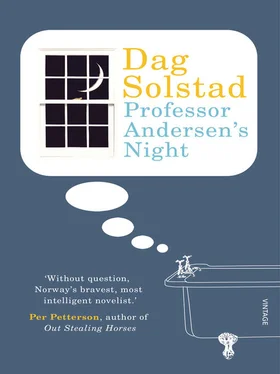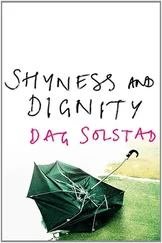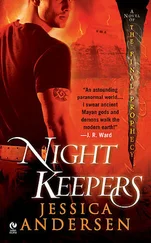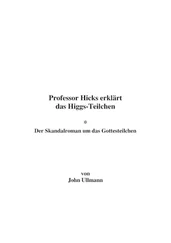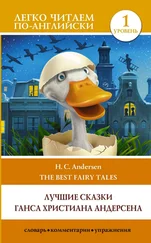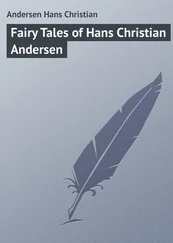Dag Solstad - Professor Andersen's Night
Здесь есть возможность читать онлайн «Dag Solstad - Professor Andersen's Night» весь текст электронной книги совершенно бесплатно (целиком полную версию без сокращений). В некоторых случаях можно слушать аудио, скачать через торрент в формате fb2 и присутствует краткое содержание. Год выпуска: 2011, Издательство: Harvill Secker, Жанр: Современная проза, на английском языке. Описание произведения, (предисловие) а так же отзывы посетителей доступны на портале библиотеки ЛибКат.
- Название:Professor Andersen's Night
- Автор:
- Издательство:Harvill Secker
- Жанр:
- Год:2011
- ISBN:нет данных
- Рейтинг книги:3 / 5. Голосов: 1
-
Избранное:Добавить в избранное
- Отзывы:
-
Ваша оценка:
- 60
- 1
- 2
- 3
- 4
- 5
Professor Andersen's Night: краткое содержание, описание и аннотация
Предлагаем к чтению аннотацию, описание, краткое содержание или предисловие (зависит от того, что написал сам автор книги «Professor Andersen's Night»). Если вы не нашли необходимую информацию о книге — напишите в комментариях, мы постараемся отыскать её.
Professor Andersen fails to report the crime. The days pass, and he becomes paralysed by indecision. Desperate for respite, the professor sets off to a local sushi bar, only to find himself face to face with the murderer.
Professor Andersen's Night
Professor Andersen's Night — читать онлайн бесплатно полную книгу (весь текст) целиком
Ниже представлен текст книги, разбитый по страницам. Система сохранения места последней прочитанной страницы, позволяет с удобством читать онлайн бесплатно книгу «Professor Andersen's Night», без необходимости каждый раз заново искать на чём Вы остановились. Поставьте закладку, и сможете в любой момент перейти на страницу, на которой закончили чтение.
Интервал:
Закладка:
‘I must call the police,’ he thought. He went over to the telephone, but did not lift the receiver. ‘It was murder. I must call the police,’ he thought, but still did not lift the receiver. Instead he went back to the window. The curtains were still drawn in the window in the apartment on the other side of the street. Nothing indicated that anything unusual had happened there. Late Christmas Eve, the curtains drawn, quite common. ‘But I saw it with my own eyes,’ he groaned. ‘I have witnessed a murder, I must let someone know.’ He stared across at the window with the drawn curtains. He stared and stared. Thick curtains that did not let a glimpse of light in or out. ‘What on earth has happened?’ he thought. ‘It is horrible really, and right in front of my eyes, too. I saw it with my own eyes, didn’t I? Yes, I can describe it in detail. I must call the police.’ He went over to the telephone, but didn’t lift the receiver. ‘What shall I say,’ he thought, ‘that I have seen a murder? Yes, that’s what I have to say. And then they will laugh at me, and tell me to go and lie down, and to call back when I have sobered up, because it is a well-known fact,’ he added, ‘that when you have drunk a bit and try to sound sober, you may easily be considered fairly heavily intoxicated, because you get so anxious about sounding slurred that slurring positively takes hold of you. And so beside myself as I am now, it won’t work.’
Instead, he stationed himself at the window, behind the curtain, with all the lights in his living room switched off, and kept watch on the window where he had seen a murder being committed. He stood thus for several hours, in the dark in his own living room, and stared. At the rectangular surface over there. Which shut out what he had seen. ‘It is odd that I don’t call the police,’ he thought. ‘It is still not too late. Even if they won’t believe me, claim that I am drunk or whatever they may say, at any rate I would have reported it, and then it’s up to them what they decide to do. It’s as simple as that.’ But he didn’t go and call them. He stood at the window and stared. Stared across at the rectangular surface over there. Was he in there still? Probably, because he hadn’t seen any man come out of the front entrance on his own. But he could have fled while Professor Andersen was over at the telephone. But then why would he have drawn the curtains? ‘No, he has to be in there still,’ thought Professor Andersen. ‘Behind those thick curtains is a young man in the company of a dead woman, whom he has just murdered. And I know it,’ he thought, ‘but I’m not doing anything about it. I ought to have phoned, for my own sake, if for no other reason. It’s curious. I know I should have done it, but I can’t. That is how it is, I simply cannot do it.’
He continued to stare at the closed window, but also kept watch on the front entrance, in case the murderer should come out. But nothing happened. It was late at night, and Professor Andersen noticed that he was sleepy. What was he standing there for? To see if the curtains were suddenly drawn back again? Or if the murderer came out of the front entrance, so he could take a look at him? Why should he do that? What was the purpose of that? Did he have to see the man he was incapable of reporting to the police, so that he could be arrested for the murder he had just committed? Why on earth would he have to do that? Professor Andersen had to admit that he cherished an obsessive desire to see the murderer. Otherwise why would he be standing here at the window keeping a closer and closer eye on the front entrance? Because there was one thing of which he was certain: that he had fastened his gaze on that closed window for so long in the hope of seeing the curtains being drawn back, due surely to a crazy notion that everything would be as before, that the young woman would appear in the window, young and beautiful as before, for some reason or other, which he wouldn’t need to speculate about. But when his eyes slipped towards the front entrance, it was to catch the murderer bounding away, not to see the impossible dream of the young couple coming out of it, whistling, on the night before Christmas Day; oh no, he didn’t have the slightest belief in that at all, not even as an impossible hope; as his eyes now swept over the front entrance, it was to see the murderer bounding away, the murderer’s face, an obsessive wish for that to happen. Nevertheless, Professor Andersen found this wish so distasteful that he decided not to stand there embroiled in the situation until he fulfilled this singular urge to see the murderer’s face. So he went to bed.
He managed to sleep. Uneasily, to be sure, but he slept. He tossed and turned in bed, more or less in an uneasy doze, but he slept. Towards morning he woke up as he needed to get up and pee. He tumbled out, and went to the toilet. When he was finished, he tumbled back into bed, but only after making a detour through the living room, where he went over to the window and stared across at the apartment on the other side of the street. The curtain was still drawn. He went back to bed, and when he woke up, it was late in the day.
He went to the bathroom and showered. Put on the same suit as the day before, white shirt and a tie, black shoes, since it was Christmas Day, and went out into the kitchen to make breakfast. While he was laying the table in the dining room he walked over to the window and stared out. It had begun to snow. Large snowflakes were floating down from the sky and had covered the street and the pavement. It seemed so peaceful that Professor Andersen felt a pang in his heart as he let his gaze rest on the window of the apartment straight across the street. The curtain was still drawn. He ate his Christmas breakfast, and decided afterwards to go for a walk in the snowy weather.
Professor Andersen had a roomy apartment in Skillebekk, a residential area down by the sea at Frognerkilen, but cut off from the sea first by the (now disused) railway line and then by the motorway, which is the main traffic route into West Oslo. There was a chill in the air, which hit him in the face as he came out of the entrance and turned round the corner into Drammensveien, while at the same time he noticed that the snow was falling thick and fast and was settling in his hair (he was bare-headed). The snow was already quite deep and it hadn’t been cleared, except in Drammensveien itself, and a cheerful, resigned mood prevailed in the side streets, whilst car owners had great difficulties driving off in their cars, and since it was Christmas Day, and no real duties awaited anyone, this led to noisy agreement about the chaotic wintry conditions which the night’s, or the early morning hours’, snowfall had caused, and it all seemed terribly social to Professor Andersen as he stomped through the snow among all the cheerful people, who were drawing attention to their futile but demanding tasks. He walked up Niels Juels gate, to Bygdøy Allee, and from there further on towards Briskeby. He was only out for a walk, as were a great many others that Christmas morning. But even before he reached Briskeby he decided to turn back. He couldn’t bear to walk, he felt so heavy at heart. He was extremely restless. ‘Oh,’ he thought, ‘I wish I had phoned after all, then this episode would have been over and done with. Then it would just have been an exciting episode, which would have been over as far as I was concerned. But now I’m so restless,’ he thought, and decided to turn back.
For an instant, however, he wondered if he shouldn’t carry on all the same, up towards Briskeby and from there along Briskebyveien in order to go up Industrigata to Majorstua and to the police station in Jacob Aalls gate. ‘After all, I can report it now,’ he thought. ‘Then it is over and done with. Certainly I might run into some unpleasantness, because I haven’t told them before, but everybody is bound to understand, if they just try to understand, that it can happen to the best of people.’ For an instant he was so strongly tempted by the idea of carrying on up towards Briskeby, along Briskebyveien, right up to Majorstua police station, that he felt positively relieved by the very possibility of it. But no sooner had he felt this sense of relief coursing through his body than he realised that these were in any case just idle thoughts, which could cheer him up true enough, momentarily, but which he was never going to act on, and he decided once and for all to stop toying with such hypothetical ideas, which only led him deeper and deeper into the mire, or so he put it to himself, whilst he turned and walked back down Niels Juels gate towards Skillebekk again. He headed back home, anxious to see if anything had happened. He managed to stop himself looking over at the window in the other apartment building, while he himself was down on the street, in front of the building where he lived, with the other building on the other side of the street, and waited until he had unlocked the door at the front entrance and had gone up the stairs to his own apartment and let himself in there and gone over to the window. No. It was the same.
Читать дальшеИнтервал:
Закладка:
Похожие книги на «Professor Andersen's Night»
Представляем Вашему вниманию похожие книги на «Professor Andersen's Night» списком для выбора. Мы отобрали схожую по названию и смыслу литературу в надежде предоставить читателям больше вариантов отыскать новые, интересные, ещё непрочитанные произведения.
Обсуждение, отзывы о книге «Professor Andersen's Night» и просто собственные мнения читателей. Оставьте ваши комментарии, напишите, что Вы думаете о произведении, его смысле или главных героях. Укажите что конкретно понравилось, а что нет, и почему Вы так считаете.
